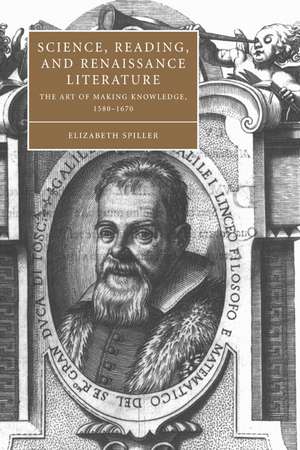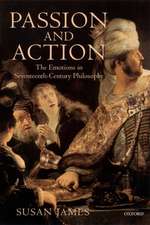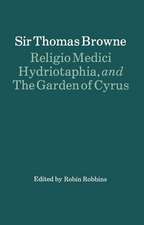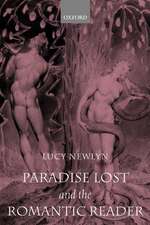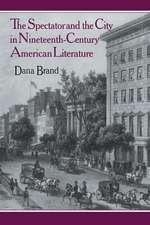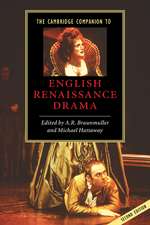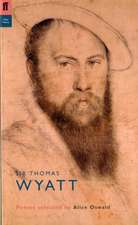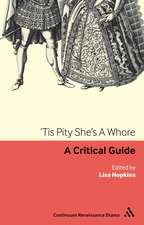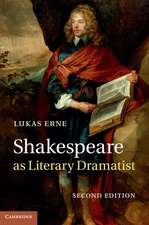Science, Reading, and Renaissance Literature: The Art of Making Knowledge, 1580–1670: Cambridge Studies in Renaissance Literature and Culture, cartea 46
Autor Elizabeth Spilleren Limba Engleză Paperback – 11 iul 2007
| Toate formatele și edițiile | Preț | Express |
|---|---|---|
| Paperback (1) | 446.32 lei 6-8 săpt. | |
| Cambridge University Press – 11 iul 2007 | 446.32 lei 6-8 săpt. | |
| Hardback (1) | 694.58 lei 6-8 săpt. | |
| Cambridge University Press – 26 mai 2004 | 694.58 lei 6-8 săpt. |
Din seria Cambridge Studies in Renaissance Literature and Culture
-
 Preț: 273.13 lei
Preț: 273.13 lei -
 Preț: 374.44 lei
Preț: 374.44 lei -
 Preț: 308.12 lei
Preț: 308.12 lei -
 Preț: 383.10 lei
Preț: 383.10 lei -
 Preț: 396.15 lei
Preț: 396.15 lei -
 Preț: 441.58 lei
Preț: 441.58 lei -
 Preț: 346.52 lei
Preț: 346.52 lei -
 Preț: 315.16 lei
Preț: 315.16 lei -
 Preț: 295.03 lei
Preț: 295.03 lei -
 Preț: 447.85 lei
Preț: 447.85 lei -
 Preț: 398.65 lei
Preț: 398.65 lei -
 Preț: 291.72 lei
Preț: 291.72 lei -
 Preț: 290.67 lei
Preț: 290.67 lei -
 Preț: 428.43 lei
Preț: 428.43 lei -
 Preț: 339.70 lei
Preț: 339.70 lei -
 Preț: 286.69 lei
Preț: 286.69 lei -
 Preț: 285.16 lei
Preț: 285.16 lei -
 Preț: 281.88 lei
Preț: 281.88 lei -
 Preț: 445.34 lei
Preț: 445.34 lei - 14%
 Preț: 820.69 lei
Preț: 820.69 lei -
 Preț: 443.11 lei
Preț: 443.11 lei -
 Preț: 286.30 lei
Preț: 286.30 lei -
 Preț: 379.25 lei
Preț: 379.25 lei -
 Preț: 299.17 lei
Preț: 299.17 lei -
 Preț: 282.10 lei
Preț: 282.10 lei -
 Preț: 395.17 lei
Preț: 395.17 lei -
 Preț: 310.45 lei
Preț: 310.45 lei -
 Preț: 424.67 lei
Preț: 424.67 lei
Preț: 446.32 lei
Nou
Puncte Express: 669
Preț estimativ în valută:
85.42€ • 88.94$ • 72.19£
85.42€ • 88.94$ • 72.19£
Carte tipărită la comandă
Livrare economică 10-24 martie
Preluare comenzi: 021 569.72.76
Specificații
ISBN-13: 9780521037686
ISBN-10: 0521037689
Pagini: 232
Ilustrații: 8 b/w illus.
Dimensiuni: 151 x 228 x 13 mm
Greutate: 0.35 kg
Editura: Cambridge University Press
Colecția Cambridge University Press
Seria Cambridge Studies in Renaissance Literature and Culture
Locul publicării:Cambridge, United Kingdom
ISBN-10: 0521037689
Pagini: 232
Ilustrații: 8 b/w illus.
Dimensiuni: 151 x 228 x 13 mm
Greutate: 0.35 kg
Editura: Cambridge University Press
Colecția Cambridge University Press
Seria Cambridge Studies in Renaissance Literature and Culture
Locul publicării:Cambridge, United Kingdom
Cuprins
List of figures; Acknowledgements; Introduction: making early modern science and literature; 1. Model worlds: Philip Sidney, William Gilbert and the experiment of worldmaking; 2. From embryology to parthenogenesis: the birth of the writer in Edmund Spenser and William Harvey; 3. Reading through Galileo's telescope: Johannes Kepler's dream for reading knowledge; 4. Books written of the wonders of these glasses: Thomas Hobbes, Robert Hooke and Margaret Cavendish's theory of reading; Afterword: fiction and the Sokal hoax; Notes; Index.
Recenzii
'Nowadays, we tend to think of science and literature as two cultures which have little in common, but Elizabeth Spiller's excellent study, Science, Reading, and Renaissance Literature, explores an age when these disciplines were united by a 'shared aesthetics of knowledge'. Spiller skilfully dismantles our current assumption that 'literature is fiction and science is fact', arguing that early modern writers understood that 'knowledge involves form as well as content … Spiller's perceptive parallel readings of texts usually kept separate is a valuable addition to scholarship on the early modern period, as well as to the study of science and literature.' The Times Literary Supplement
'Original, learned and compelling. Spiller's superb discussion of Cavendish places her appropriately in very serious company.' Studies in English Literature
'… richly-documented pages, written in a clear and pleasant style …' Cahiers Élisabéthains
'… a rewarding contribution to the intersections between literature and natural philosophy. … powerful and rewarding, in large part thanks to her striking combinations of authors within chapters and her vigorous readings of a wide range of texts.' Minerva
'… she has opened the door to a complicated and complex area of study. Her linking of these radically different writers in seemingly disparate disciplines, her focus on sensory perception, and her discussion of the generation of knowledge are perceptive and illuminating … the book is well worth the read.' Dr John Holmes, Lecturer in English, University of Reading
'Original, learned and compelling. Spiller's superb discussion of Cavendish places her appropriately in very serious company.' Studies in English Literature
'… richly-documented pages, written in a clear and pleasant style …' Cahiers Élisabéthains
'… a rewarding contribution to the intersections between literature and natural philosophy. … powerful and rewarding, in large part thanks to her striking combinations of authors within chapters and her vigorous readings of a wide range of texts.' Minerva
'… she has opened the door to a complicated and complex area of study. Her linking of these radically different writers in seemingly disparate disciplines, her focus on sensory perception, and her discussion of the generation of knowledge are perceptive and illuminating … the book is well worth the read.' Dr John Holmes, Lecturer in English, University of Reading
Notă biografică
Descriere
Science, Reading, and Renaissance Literature brings together key works in early modern science and imaginative literature.
